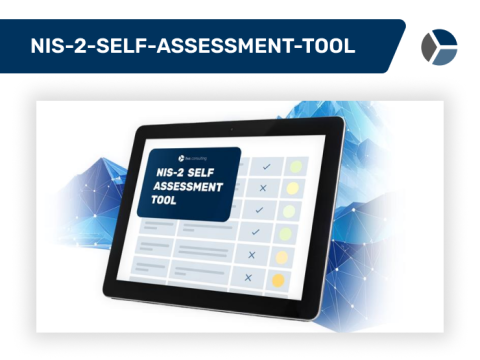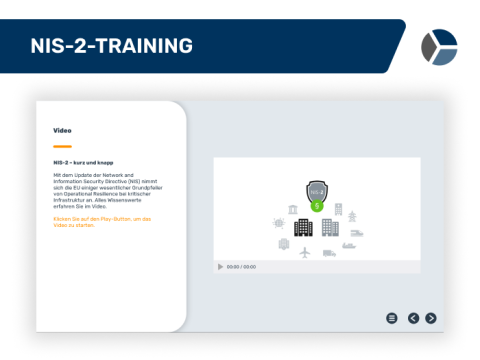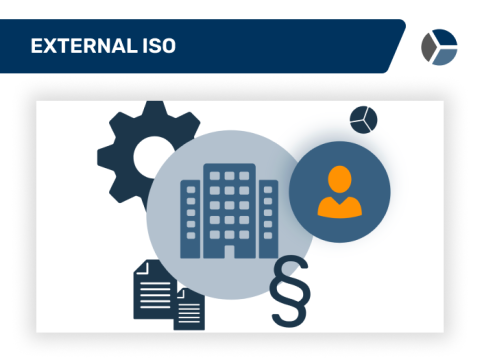500+ customers place their trust in us – from startups to large companies
Your goal
You want to establish an Information Security Management System (ISMS) - not only to protect your company data, but also to meet the requirements of NIS-2 legislation.
Our service
We work with you to design a company-specific ISMS, establish necessary processes and guidelines and anchor them in the company. When completed, we leave you not only with documents, but with a great deal of know-how.
The result
The basic features of your ISMS are established and you are compliant with the requirements of NIS-2. You know everything a Chief Information Security Officer (CISO) needs to operate and further optimize the established ISMS.
The steps to your ISMS according to NIS-2
NIS-2 Gap Analysis
The first step is an NIS-2 gap analysis. Through a mixture of document review and interview sessions with the relevant departments, our experienced consultants assess and evaluate the status of your current implementation based on the requirements of NIS-2.
This NIS-2 gap analysis gives you and us a clear picture and enables us to realistically estimate the implementation effort, clearly structure the project and define the necessary work packages.
If you have already carried out a gap analysis, we will work with this and will not carry it out again.
Establish framework
Once we have identified the fields of action, we work with you to create the framework and foundation for a functioning ISMS that meets the requirements of NIS-2:
- We define the scope, based on the requirements of your stakeholders (e.g. management, parent company, client or business contacts).
- We define and establish the security policy and objectives.
- We clarify the required security organization including roles, committees and their responsibilities.
- We create the necessary project organization for setting up the ISMS.
Set up guidelines
We can only achieve the defined information security objectives by establishing clear and unambiguous rules. We define these “rules” in various guidelines, both for the entire workforce within the scope of the ISMS and for specific areas or target groups (e.g. IT admins, software development, purchasing, human resources or facility management).
We do not reinvent the wheel here, but use our numerous templates, which have already been successfully tested in practice for several years and are regularly updated so that they always correspond to the state of the art.
We coordinate the guidelines with the necessary people in the specialist departments and integrate them into the relevant business areas.
Information Security Risk Management
Information security risk management (InfoSec risk management) is at the heart of an effective ISMS in accordance with NIS-2, as it helps you to distinguish the important from the unimportant and always proceed pragmatically.
We work with you to create the necessary structural and procedural organization to record, evaluate, handle (i.e. derive appropriate measures) and document all relevant information security risks in a structured and systematic manner.
If you already have a risk management system or your own risk management approach in your company, we will build on this and add any missing relevant aspects of NIS-2.
Implement measures
Implement measures
Now it's time to implement the defined measures. In this phase, we provide very targeted coaching and also support you as required in the event of any resource bottlenecks. It is important to us to prepare you or a member of your team in the best possible way for the tasks of an Information Security Officer.
During implementation, we attach great importance to practicable solutions, i.e. to ensuring that the measures
- contribute to achieving the desired level of security,
- are economical and feasible and
- meet the requirements of NIS-2.
Internal audit
In order to check the effectiveness of the established ISMS, internal ISMS audits should be carried out regularly - and rightly so, as internal audits put the effectiveness of the established ISMS to the test, among other things.
Added value of internal ISMS audits:
- Statement on the effectiveness and maturity level of the ISMS.
- Technical and organizational weaknesses can be identified in a structured manner through audits
Provision of proof
The short answer is “it depends”. But what does it actually depend on?
- Operators of critical infrastructures (which count as “essential entities”) must provide evidence of the implementation of the requirements every 3 years (typically in the form of audits, tests or relevant certifications such as ISO 27001) and the results of these tests must be submitted to the BSI.
- Essential entities do not currently have to provide regular evidence. However, the BSI has the right to demand corresponding proof of implementation or to check compliance with the requirements.
- There are also currently no regular verification obligations for important entities. Here too, the BSI requested the right to check the implementation of the requirements.
Want our help to help yourself?
Let's get to know each other in a web meeting and talk about your situation and goals. We will show you how we have helped in similar customer situations.
Other ISMS services that might interest you

Prepare Your Company for the NIS-2 Directive: Free Self-Assessment Tool with Checklist, Maturity Evaluation, and Concrete Compliance Actions.

One hour of training for management bodies in accordance with NIS-2 (§38 BSIG), available as an in-person event or e-learning course. Fast, efficient, developed by security and learning professionals.

External ISO – experienced, well-proven, immediately available. Efficient ISMS support for IT security & data protection. Get support now!